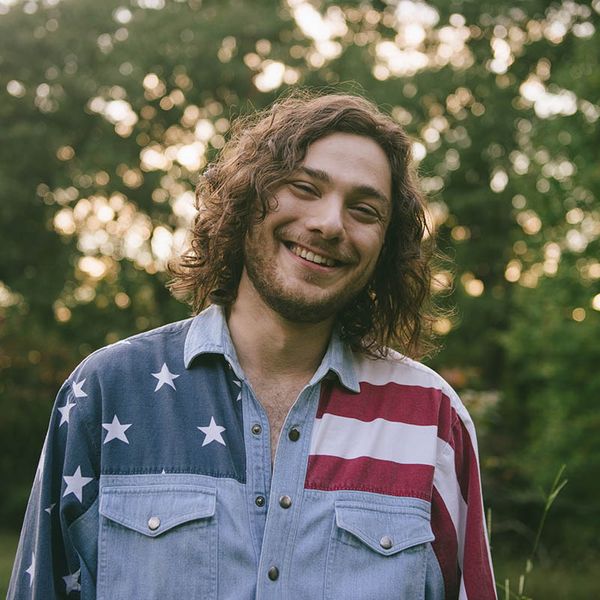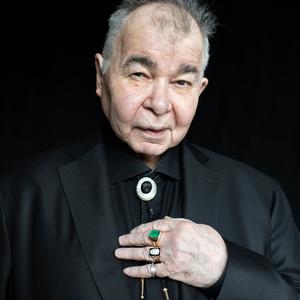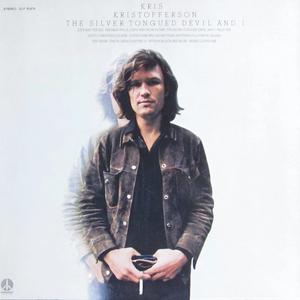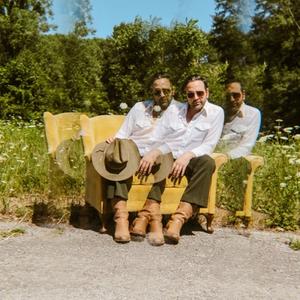




Link copied

“They call me country and I play along”, Elliah Heifetz sings in the joyously tongue-in-cheek title track to his new album First Generation American; a raucously uplifting anthem for children of immigrants everywhere that sounds like an all-cast singalong from a country musical.
It’s just one of the songs on his new album that takes the overtired tropes of country music and affectionately tips them up on their arse with a playfulness and sagacity reminiscent of John Prine and Kris Kristofferson.
Elliah Heifetz is a first-generation American born to political refugees from the Soviet Union, and as someone who's been called "less than American" all his life, the playful country-folk of his debut album First Generation American feels more authentically “Americana” than anything else coming out right now. Country music is born out of this kind of melting pot.
“My parents came from an Iron Curtain / Neighbors couldn’t say my name so well” he sings, setting his life story down on record. “But I was raised by the constitution in the cracks of the Liberty Bell”.
Raised on food stamps in the Little Russia neighborhood of Philadelphia, Heifetz comes from a centuries-long lineage of Jewish folk musicians in Eastern Europe. Unlike his ancestors, however, he was born here in America and grew up on the sounds of this strange new land. Soon enough, Heifetz was hooked on fiddle tunes and banjo solos.
He composed a stage musical while studying at Yale college - a bluegrass-driven, Woody Guthrie inspired Dust Bowl parable called Dust Can’t Kill Me. When it won Best Music at both the NYC Fringe and the New York Musical Festival, it connected him with The Brain Music.
They soon became Heifetz’s pop music publisher and within just a few years, Heifetz was writing pop songs for major label projects, network television soundtracks and more award-winning scores for the New York stages. He also continued to flirt with country and roots music, writing a roots-rock Western musical that’s now been optioned by Broadway producers SBR Productions.
Despite all this success, Heifetz was still yearning to write and sing songs that told his own story, which led him to his debut EP New Folk Songs in 2019.
The EP was met with widespread critcial acclaim, but he still felt like he was holding something of himself back. Until, in late 2020, Heifetz connected with fellow first-generation American Andrija Tokic, and went to Nashville to track 13 new songs with him at his famous all-analogue Bomb Shelter studio, along with an all-star band of legendary musicians.
It’s these songs that together make up the remarkable First Generation American. This is the album he says he’d always been born to write, as he pays homage to country music’s traditions while upturning every exclusionary apple cart along the way. He follows much in the same way as The Kernal and Langhorne Slim; artists who are breathing new life into a lineage that leads all the way back through John Prine and Kinky Friedman to Cowboy Jack Clement and Roger Miller. Elliah Heifitz is a certified country music misfit, and lord knows it needs as many of those as it can get right now.
It’s perhaps because it comes from such an usual place that First Generation American feels like such a vital album for these divisive and turbulent times. It's a way to confront the bitter reality of America's hateful roots and complex future with a knowing wink and a fearless smile, all the while armed with the raw poetry of the outcasts.
“Come on, let’s go sore thumb stickin’ / Left-wing, nose ring, old time pickin’ / You just wait / the world will listen once we take the floor”, sings Heifitz on ‘Country Harmony’, the joyously self-effacing duet with Jane Bruce, while ‘Anxiety’ tackles mental illness in the same way that Heifetz seems to confront everything - with a good humoured irreverence that is capable of defanging even the mightiest of demons.
Holler sat down with Elliah to talk to him about his journey into country music, writing musicals and growing up as a first-generation American.
Where are you from and how has that influenced you?
I was born on Bustleton Avenue in Northeast Philadelphia, Philly’s “Little Russia” neighborhood - where everything from shop names to billboards are in Cyrillic Russian letters.
I moved to a different part of greater Philly a few years later, but my grandmothers never did, so with two working parents, I ended up spending a lot of time at my grandmas’ apartments surrounded by memorabilia from the former USSR and hearing only Russian spoken.
This definitely created a profound, long-lasting awareness of the worlds I was (and will always be) straddling as a first-generation American. Even just thinking about how my first language was Russian, I’m convinced that hearing English before being able to understand it is the reason I became so obsessed with lyrics and how beautiful English can sound.
What music did you grow up listening to?
My dad is an incredible jazz, classical and klezmer musician (actually being a klezmer is a family legacy that stretches back centuries back in Europe), so those genres were my first introductions to music.
Being from the USSR, my parents also grew up getting illegal bootlegs of American rock’n’roll, so they also introduced me to that at a young age. But one thing that never, ever existed in our house was country music.
I truly can’t explain why the rock music I liked most happened to be the most country and folk-inflected kind, or why the first time I heard a bluegrass song I couldn’t stop listening to it. But as soon as the roots, folk, Americana, country, etc. genres started seeping into my rotation, it was a one way street to where I am now.
How did you end up making the sort of music you do?
As the first Heifetz born in America, I was also the first to not have any expectations of fulfilling family legacies and upholding traditions like I would’ve in Soviet Latvia. So, instead of encouraging me to follow in my fathers’ footsteps and become a musician, they did the exact opposite.
But one thing led to another, and while playing in a band in college, a playwright friend of mine asked if I’d write a musical with her. I hadn’t ever written a whole song on my own before, but I thought it sounded fun, so I said sure - as long as it could reflect the kind of music I liked best - folk and country.
So we built a Dust Bowl-era, Woody Guthrie-inspired musical fable that to all of our surprises ended up transferring from our little college theatre to a festival in New York, and then to another, even more prestigious festival.
Pretty soon, I was writing all kinds of roots music inspired theatre music. But eventually it started getting to me that I was only telling other peoples’ stories through the voices of fictional characters - there were just some stories of my own that I knew I needed to tell myself. I still write musicals and have several in development, but I’m grateful to finally be sharing my own truths through my own voice, through the musical idioms that speak to me the most.
Can you tell us a bit about the musical you wrote, Dust Can’t Kill Me, and how musicals fit in with everything else you do?
Dust Can’t Kill Me is the first musical I ever wrote, also incidentally the first collection of finished songs I ever wrote - it’s the Woody Guthrie-inspired show I mentioned a moment ago. In it, a preacher’s promise of paradise sends a ragtag crew of Dust Bowl outcasts and refugees into the heart of the American desert. It’s sort of our take on Paradise Lost, with a look at how people take advantage of each other when times are hard but how hope can always find a way to persist.
All of my musicals tell American stories - whether it’s a revisionist Western about a female bounty hunter or a retelling of a Russian fairytale set in Appalachia, I’m always trying on some level to rewrite our American myths so they include all Americans.
There’s nothing like writing a musical to hone your storytelling skills. When it comes to writing my own Americana and country music, storytelling-heavy genres mythologized as stereotypically “American”, it feels like an extension of the same work I do for the stage.
What inspired First Generation American?
The obvious answer here is of course my own upbringing and family history, but the specific moment the idea for the album crystallized happened during the Trump presidency.
Seeing children torn from mothers’ arms at the border and the rampant xenophobia exacerbated by the President, I felt compelled (as someone with immigrant parents and a platform to speak on these topics) to address it through my music. I started writing the lyrics to the title song, but as one page in a notebook turned into ten, I realized I had too many stories to fit into just one song. Pretty soon I was choosing from over 30 to record just 13.
What’s the most unexpected place music has taken you?
I got to do a world tour with my singing group in college, which definitely took me to some unexpected places. I’ll never forget the jam session I had with a group of local musicians on a beach in Zanzibar, who were fusing the music they grew up with into American folk and rock. Getting to harmonize with them on their own tunes was pretty incredible.
If you could time travel back to any time when would you travel back to?
I think my dream time travel scenario would be to have a portal into a 70s/80’s Cheers-style bar that literally only takes me to that one bar and nowhere else.
Which person from history would you most like to meet?
It’s heartbreaking to even say this, since it was a life-long dream of mine to meet him up until he passed recently, but if I could go back even a few years and meet John Prine, I’d choose that over meeting William Shakespeare or Leonardo DaVinci any day.
Would you like to go into space?
A hundred thousand million bajillion times yes. I’m obsessed with outer space. I thought about getting the first-ever image of a black hole tattooed on my body. I would be scared to death on the way up and probably the whole time I was out there, but to look out into the stars without the atmosphere in the way, would be one of my three wishes if I found a genie in a bottle.
What advice would you give to the younger you?
Learn to play the guitar really well and start way, way freakin’ sooner. Finish songs even if they suck - finishing a song is its own skill and you can’t get good at writing whole songs unless you write whole songs. Also, make sure you prioritize listening and observing.
What’s next for you?
In addition to some soon-to-be-announced live dates in support of this album, I also have a musical going up at Iowa State University in April, another musical in workshop this summer - most likely in NYC - and a third in workshop in D.C. in August. There are a few other things I’m not able to announce yet but I really hope I can soon - keep your eyes peeled for more!
First Generation American is out now on Legal Smile records.





